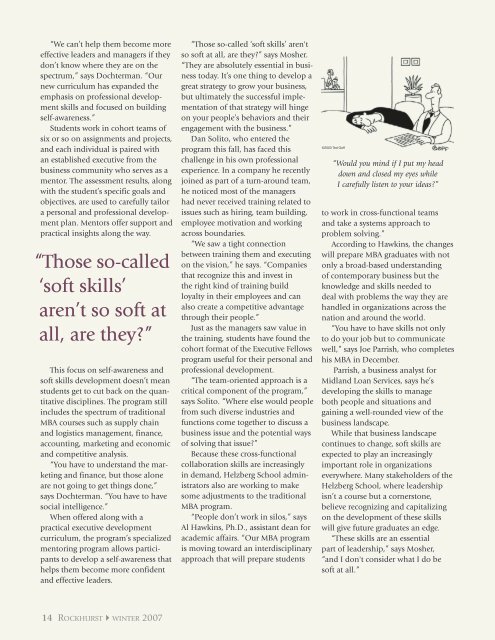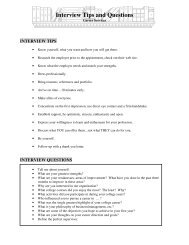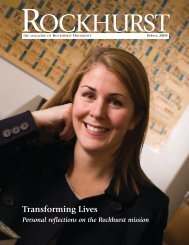The Perspectives That Divide Us - Rockhurst University
The Perspectives That Divide Us - Rockhurst University
The Perspectives That Divide Us - Rockhurst University
- No tags were found...
Create successful ePaper yourself
Turn your PDF publications into a flip-book with our unique Google optimized e-Paper software.
“We can’t help them become moreeffective leaders and managers if theydon’t know where they are on thespectrum,” says Dochterman. “Ournew curriculum has expanded theemphasis on professional developmentskills and focused on buildingself-awareness.”Students work in cohort teams ofsix or so on assignments and projects,and each individual is paired withan established executive from thebusiness community who serves as amentor. <strong>The</strong> assessment results, alongwith the student’s specific goals andobjectives, are used to carefully tailora personal and professional developmentplan. Mentors offer support andpractical insights along the way.“Those so-called‘soft skills’aren’t so soft atall, are they?”This focus on self-awareness andsoft skills development doesn’t meanstudents get to cut back on the quantitativedisciplines. <strong>The</strong> program stillincludes the spectrum of traditionalMBA courses such as supply chainand logistics management, finance,accounting, marketing and economicand competitive analysis.“You have to understand the marketingand finance, but those aloneare not going to get things done,”says Dochterman. “You have to havesocial intelligence.”When offered along with apractical executive developmentcurriculum, the program’s specializedmentoring program allows participantsto develop a self-awareness thathelps them become more confidentand effective leaders.“Those so-called ‘soft skills’ aren'tso soft at all, are they?” says Mosher.“<strong>The</strong>y are absolutely essential in businesstoday. It’s one thing to develop agreat strategy to grow your business,but ultimately the successful implementationof that strategy will hingeon your people’s behaviors and theirengagement with the business.”Dan Solito, who entered theprogram this fall, has faced thischallenge in his own professionalexperience. In a company he recentlyjoined as part of a turn-around team,he noticed most of the managershad never received training related toissues such as hiring, team building,employee motivation and workingacross boundaries.“We saw a tight connectionbetween training them and executingon the vision,” he says. “Companiesthat recognize this and invest inthe right kind of training buildloyalty in their employees and canalso create a competitive advantagethrough their people.”Just as the managers saw value inthe training, students have found thecohort format of the Executive Fellowsprogram useful for their personal andprofessional development.“<strong>The</strong> team-oriented approach is acritical component of the program,”says Solito. “Where else would peoplefrom such diverse industries andfunctions come together to discuss abusiness issue and the potential waysof solving that issue?”Because these cross-functionalcollaboration skills are increasinglyin demand, Helzberg School administratorsalso are working to makesome adjustments to the traditionalMBA program.“People don’t work in silos,” saysAl Hawkins, Ph.D., assistant dean foracademic affairs. “Our MBA programis moving toward an interdisciplinaryapproach that will prepare students©2003 Ted Goff“Would you mind if I put my headdown and closed my eyes whileI carefully listen to your ideas?”to work in cross-functional teamsand take a systems approach toproblem solving.”According to Hawkins, the changeswill prepare MBA graduates with notonly a broad-based understandingof contemporary business but theknowledge and skills needed todeal with problems the way they arehandled in organizations across thenation and around the world.“You have to have skills not onlyto do your job but to communicatewell,” says Joe Parrish, who completeshis MBA in December.Parrish, a business analyst forMidland Loan Services, says he’sdeveloping the skills to manageboth people and situations andgaining a well-rounded view of thebusiness landscape.While that business landscapecontinues to change, soft skills areexpected to play an increasinglyimportant role in organizationseverywhere. Many stakeholders of theHelzberg School, where leadershipisn’t a course but a cornerstone,believe recognizing and capitalizingon the development of these skillswill give future graduates an edge.“<strong>The</strong>se skills are an essentialpart of leadership,” says Mosher,“and I don't consider what I do besoft at all.”14 Ro c k h u r s t4w i n t e r 2007
















